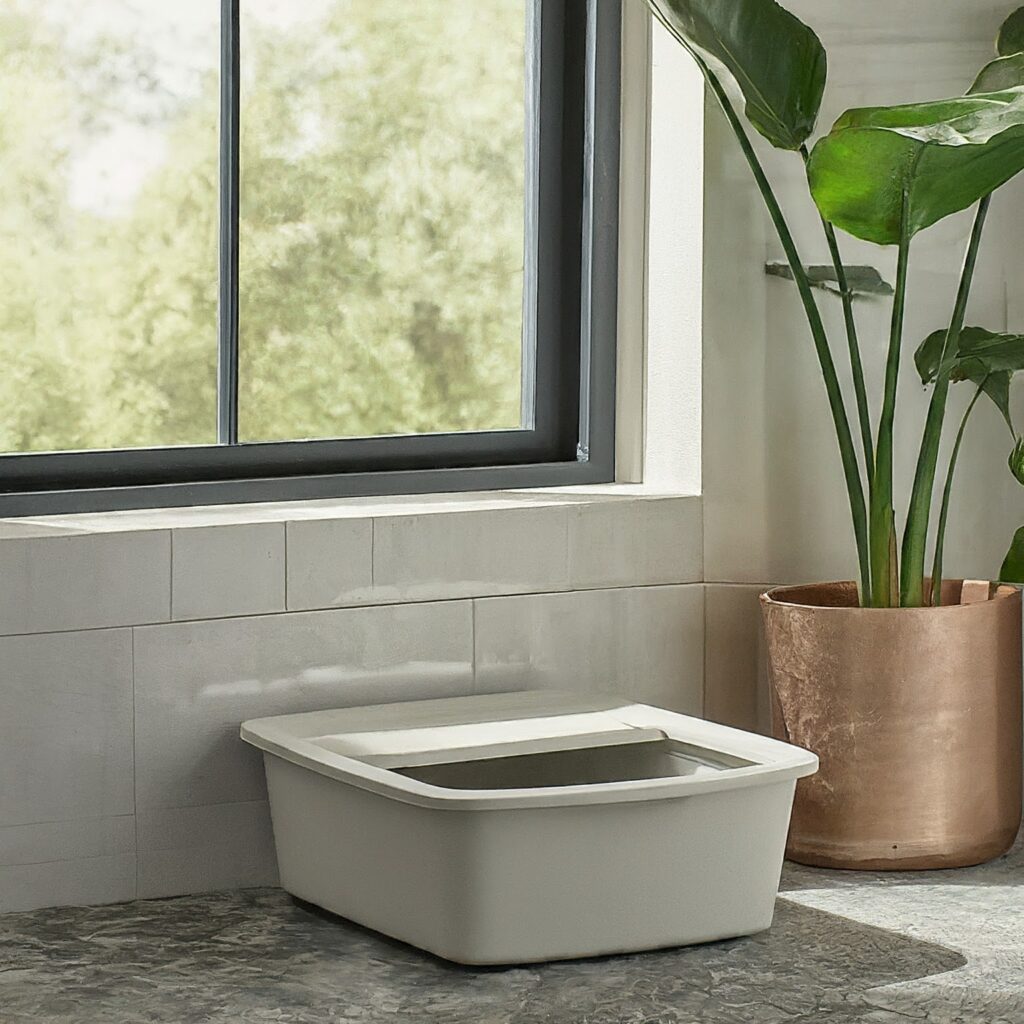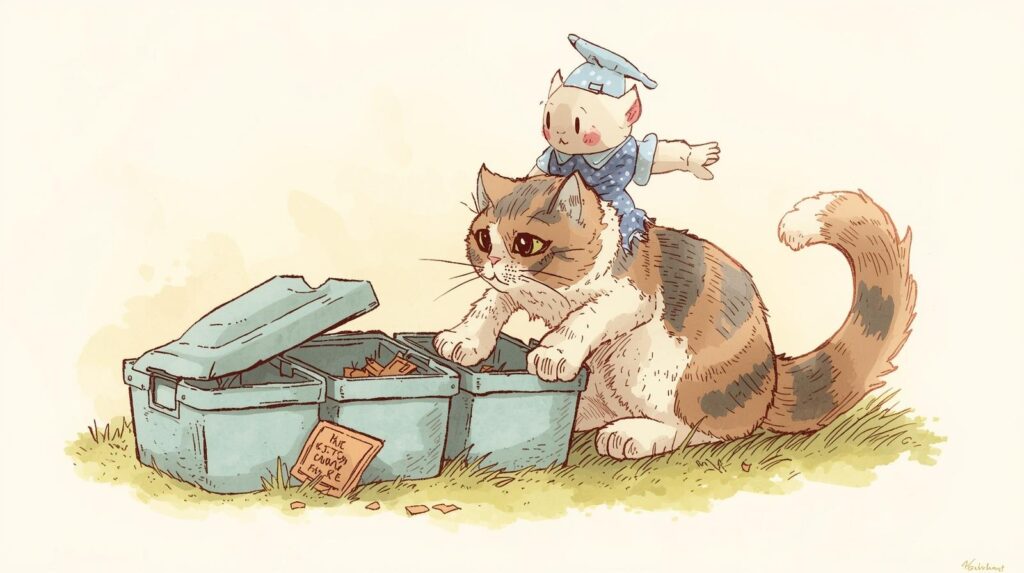If you’re a cat owner, you’re probably familiar with the strong ammonia smell in cat litter.
This unpleasant odor is not only a nuisance but can also raise concerns about your cat’s health and indoor air quality.
In this blog, we’ll explore what causes the ammonia smell in cat litter, how it impacts you and your cat, and how to minimize or eliminate it.
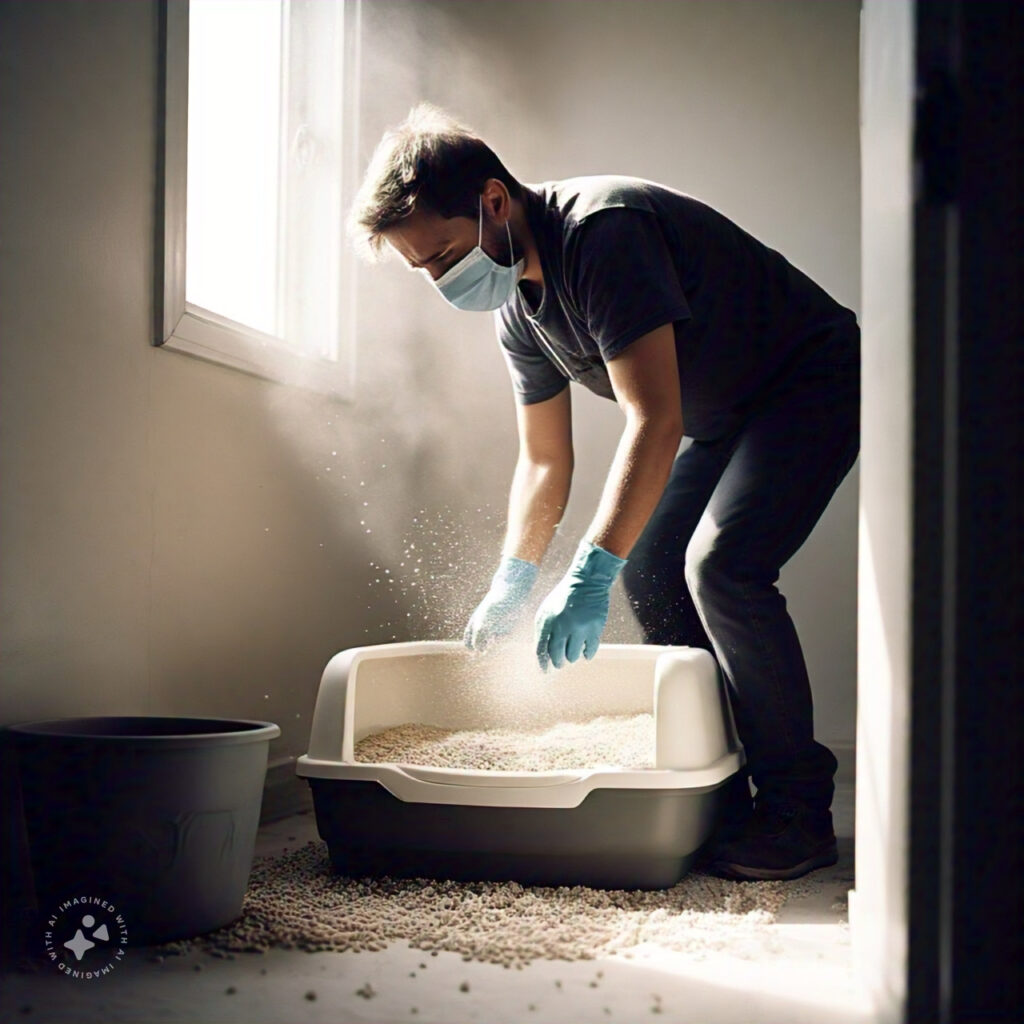
What Causes the Ammonia Smell in Cat Litter?
The primary cause of the ammonia smell in cat litter is the breakdown of urea, a component of your cat’s urine.
Here’s how it happens:
- Urine Decomposition: When your cat urinates, bacteria in the litter box start breaking down the urea, releasing ammonia gas.
- Poor Litter Quality: Low-quality litter may not absorb moisture or control odors effectively and sometimes convert litter into mud, leading to a stronger smell.
- Infrequent Cleaning: A litter box that isn’t scooped or changed regularly will accumulate urine and feces, intensifying the odor.
- High Protein Diet: Cats on a high-protein diet produce more urea, leading to a stronger ammonia smell.
- Multiple Cats: More cats mean more urine, which can overload the litter box and amplify odors.
Is the Ammonia Smell Harmful?
Yes, prolonged exposure to ammonia fumes can be harmful to both cats and humans. Here’s why:
- For Cats: Ammonia can irritate a cat’s respiratory system, potentially leading to coughing, sneezing, or other breathing difficulties.
- For Humans: Breathing in ammonia fumes can cause headaches, nausea, or irritation to the eyes and throat.
- Individuals with respiratory conditions like asthma may find it particularly problematic.
Solutions to Eliminate Ammonia Smell in Cat Litter
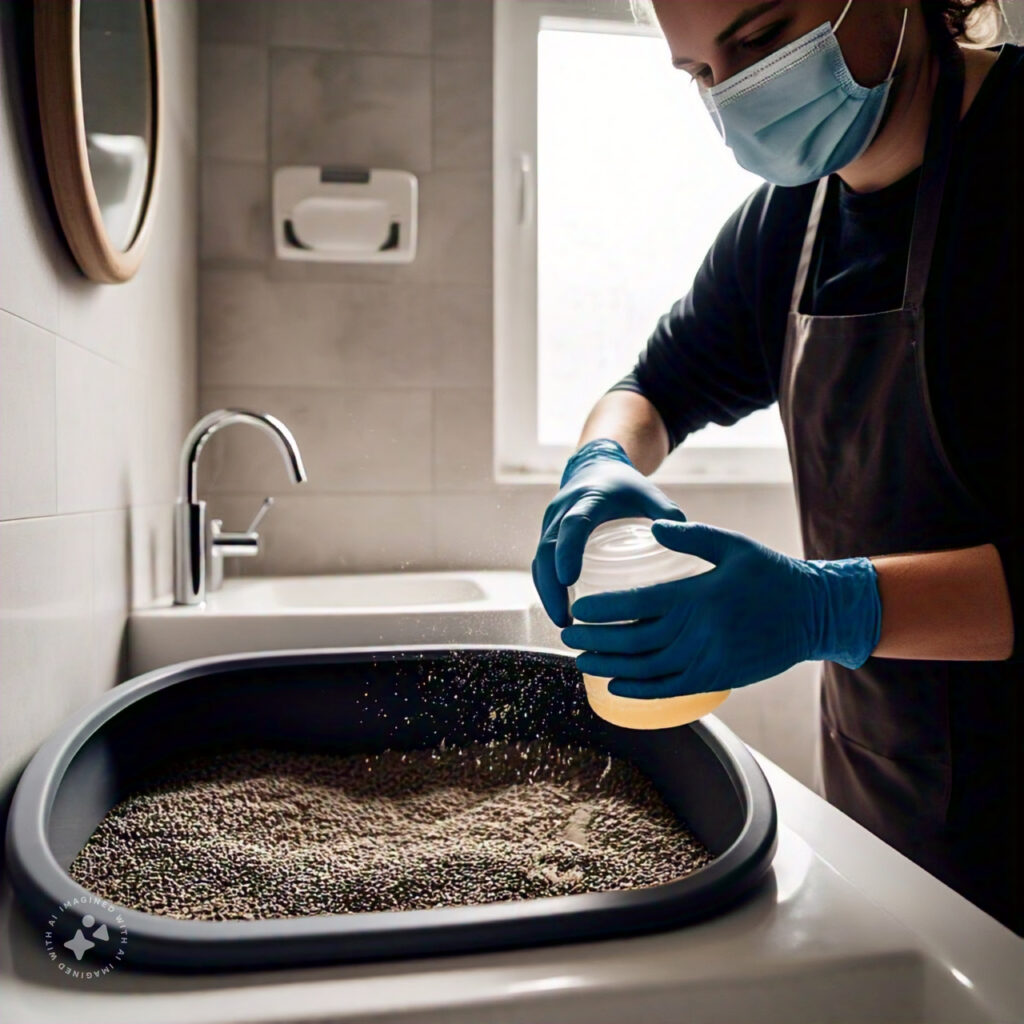
1. Choose the Right Cat Litter
Switching to a high-quality, odor-controlling litter can make a big difference, always check cat litter reviews before buying.
Look for options like:
- Clumping Litter: Traps moisture and makes scooping easier.
- Silica Gel Litter: Absorbs moisture and controls odors effectively.
- Activated Charcoal Litter: Neutralizes odors naturally.
2. Clean the Litter Box Regularly
- Daily Scooping: Remove clumps of urine and feces at least once a day.
- Weekly Cleaning: Empty the box, wash it with mild soap, and replace it with fresh litter.
- Use Baking Soda: Sprinkle a thin layer at the bottom of the box to absorb odors.
- if emptying the litter box is difficult use a vacuum.
3. Ventilate the Area
Place the litter box in a well-ventilated area to allow fresh air to circulate and reduce odor buildup.
4. Add a Litter Box Filter
Many litter boxes come with carbon filters that absorb odors. Replace these regularly for optimal effectiveness.
Here are some litter box filters to consider
5. Switch to a Covered Litter Box
Covered boxes can help contain odors, but make sure they have proper ventilation to prevent ammonia buildup inside.
check these covered litter box
6. Use Enzyme Cleaners
Enzyme-based cleaners break down urea and other organic materials, neutralizing the source of the odor. Use them to clean the litter box and surrounding areas.
Preventing Ammonia Smell in the Future
1. Upgrade the Litter Box
- Self-Cleaning Litter Boxes: These automatically scoop waste, reducing odor accumulation.
- Multiple Boxes: If you have multiple cats, provide one litter box per cat plus an extra to reduce overcrowding.
2. Monitor Your Cat’s Diet
- A balanced diet can reduce the concentration of urea in your cat’s urine. Consult your vet for dietary advice.
3. Stay on Schedule
Set reminders for daily scooping and weekly cleaning to ensure consistent maintenance.
4. Use Deodorizers Sparingly
Litter box deodorizers can help but avoid heavily scented products as they may deter your cat from using the box.
5. Odor Free Litter
Consider using odor-free litter to avoid any type of smell from the litter.
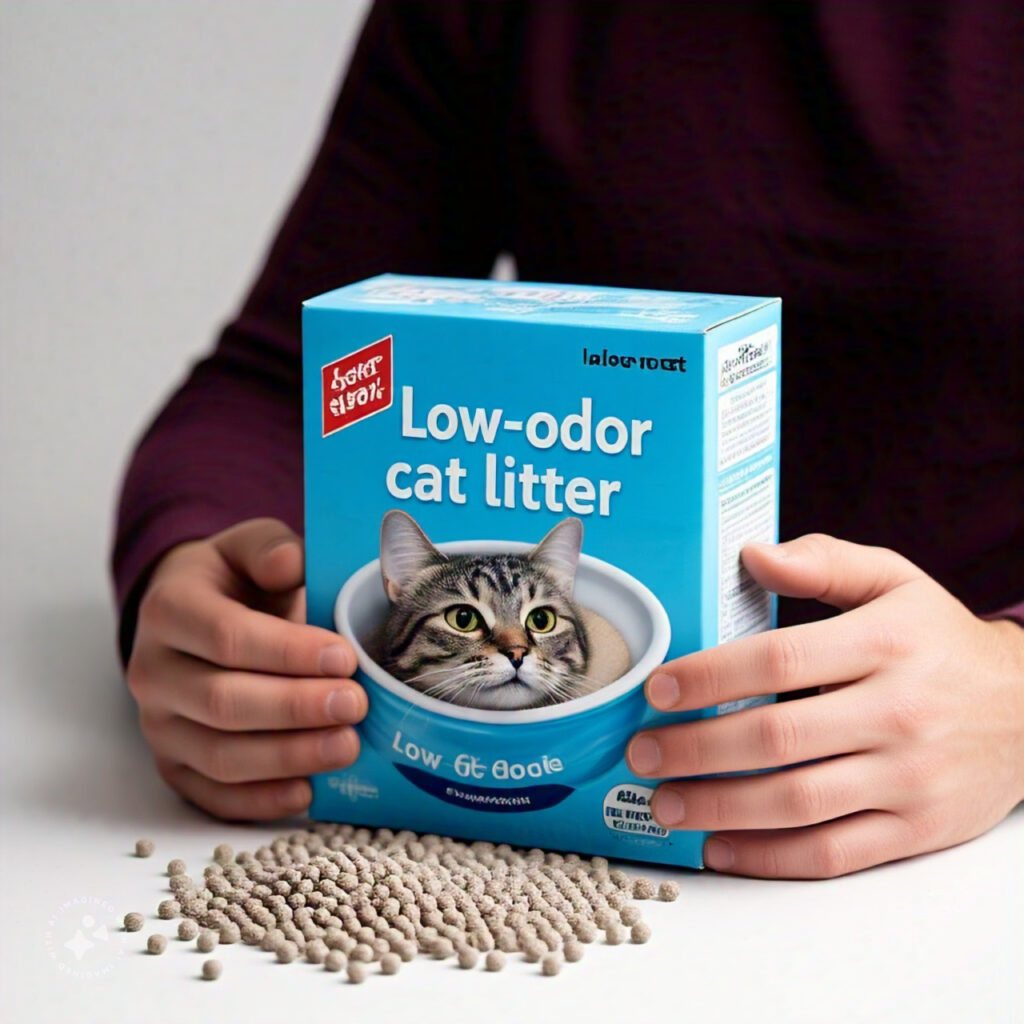
When to See a Vet
If the ammonia smell persists despite your efforts, it may indicate a medical issue with your cat. Conditions like urinary tract infections or kidney problems can cause stronger-smelling urine. Look out for other symptoms such as:
- Straining to urinate
- Blood in urine
- Frequent urination outside the litter box
- Lethargy or loss of appetite
Contact your veterinarian if you notice any of these signs.
FAQs About Ammonia Smell in Cat Litter
1. Why does my cat’s litter box smell like ammonia so quickly?
This happens if the litter isn’t absorbing moisture effectively or if it isn’t scooped frequently enough.
2. How often should I change the litter to prevent the smell?
Scoop daily and completely replace the litter every 1–2 weeks. For multiple cats, change it more often.
3. Can I use regular baking soda to reduce odors?
Yes, a light layer of baking soda at the bottom of the litter box can help absorb ammonia smells.
4. What type of litter is best for odor control?
Clumping litter with activated charcoal or silica gel is excellent for controlling odors.
5. Is the ammonia smell harmful to my cat’s health?
Yes, prolonged exposure can irritate your cat’s respiratory system and lead to health issues.
Conclusion
The ammonia smell in cat litter is not just unpleasant—it’s a sign that your litter box maintenance routine may need an upgrade. By buying the right litter, regular cleaning, and proper ventilation, you can keep the smell under control and create a healthier environment for both you and your cat.
Always pay attention to your cat’s health and behavior, as strong urine odors may sometimes indicate a medical issue. With the right approach, you can say goodbye to ammonia smells and hello to a fresher, more pleasant home.

